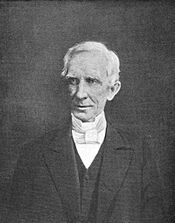Thomas William Humes
| Thomas William Humes | |
|---|---|

Portrait of Thomas William Humes by artist Lloyd Branson
|
|
| Born |
April 22, 1815 Knoxville, Tennessee, United States |
| Died | January 16, 1892 (aged 76) Knoxville, Tennessee |
| Resting place |
Old Gray Cemetery Knoxville, Tennessee |
| Alma mater | East Tennessee College |
| Occupation | Clergyman, educator |
| Notable work | The Loyal Mountaineers of Tennessee (1888) |
| Political party |
Whig Republican |
| Spouse(s) | Cornelia Williams (1835–1847, her death) Anne Betsy Williams (1849–1879, her death) |
| Parent(s) | Thomas and Margaret Russell Cowan Humes |
Thomas William Humes (April 22, 1815 – January 16, 1892) was an American clergyman and educator, active in Knoxville, Tennessee, during the latter half of the 19th century. Elected rector of St. John's Episcopal Church in 1846, Humes led the church until the outbreak of the Civil War, when he was forced to resign due to his Union sentiments. He was named president of East Tennessee University in 1865, and during his tenure, he led the school's expansion and transition into the University of Tennessee. Humes later served as the first librarian of the Lawson McGhee Library, and published a book about East Tennessee's Unionists entitled, The Loyal Mountaineers of Tennessee.
Humes was born in Knoxville in 1815, the son of Thomas Humes (1767–1816) and Margaret Russell Cowan Humes (1777–1854), both of Scots-Irish descent. Humes's father, a native of Armagh, Ireland, began building the Lamar House Hotel in 1816, but died later that same year. Humes's mother oversaw the hotel's completion, however, and under her direction, it grew to become Knoxville's premier hotel. The younger Humes was a half-brother of James Cowan (1801–1871), a cofounder of the wholesaling firm, Cowan, McClung and Company, and a stepbrother of historian J. G. M. Ramsey (1797–1884).
Humes graduated from East Tennessee College (the forerunner of the University of Tennessee) in 1831, and obtained his master's degree from the school two years later. He then entered the Princeton Theological Seminary with the intention of becoming a Presbyterian minister, but left after deciding he could not take the Westminster Confession of Faith. After returning to Knoxville, Humes briefly worked for his half-brother's business before embarking on a career in journalism. During the late 1830s and early 1840s, he worked variously as editor of the Knoxville Times, the Knoxville Register, and a Whig Party paper, The Watch Tower.
...
Wikipedia
